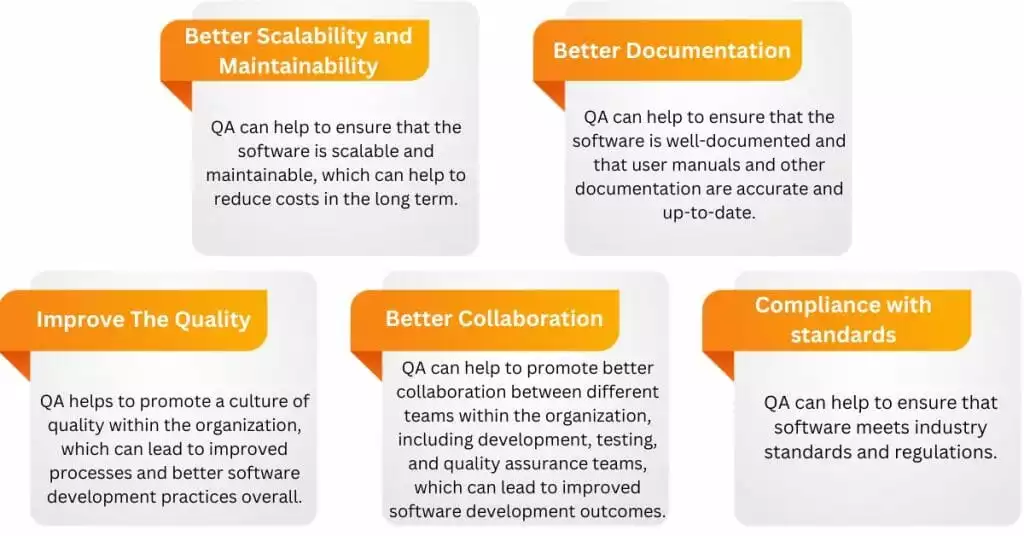The world of software development is a place where every line of code, every click, and every user interaction is put to the test. Here innovation and creativity reign supreme. But with each new breakthrough, the stakes get higher, the expectations of customers soar, and the risks of delivering subpar products skyrocket.
In this arena, quality assurance takes center stage, where meticulous attention to detail and relentless pursuit of excellence is the order of the day. Join us on this journey as we explore the art and science of quality assurance in software development, and discover how it plays a crucial role in delivering software that meets and exceeds customer expectations.
What is Software QA Means?
QA in software development is a systematic and ongoing process to ensure that software products meet customer expectations and requirements. Effective QA requires collaboration and communication between software developers, testers, and stakeholders.
It can be integrated into an organization’s software development process through the use of SQA teams, methodologies, and tools. Some examples of SQA methodologies include Waterfall, Scrum and Agile software development. By implementing a robust QA process, software development teams can improve the quality of their products, reduce the risk of defects, and increase customer satisfaction.
Imagine you have built an HR System and delivered it to many companies. A few days later, you get many complaints from your clients. After reviewing their complaints, you check your system and find many bugs and errors in the software. Then you have to start from the beginning and find out all the mistakes. Not only it has cost you more money and time but you lost the trust of many of your clients. If you maintain quality assurance during your development process, you could have made more efficient and user-friendly software for your clients.

Why Quality Assurance is Important in Software Development
Quality assurance in software development is crucial because it ensures that the end product meets the required specifications, standards, and customer expectations. By implementing rigorous testing procedures and continuous monitoring,
QA helps identify and fix defects and improves the overall reliability, usability, and performance of the software. This results in a better user experience, increased customer satisfaction, and reduced costs from fixing errors at a later stage. Quality assurance helps in maintaining the integrity and reputation of the software, ensuring that the final product is fit for its intended purpose, and building user trust in the software. Besides these obvious benefits, there are some small but significant parts where QA helps a lot.
Objectives of Quality Assurance in Software Development
Quality control in software project management is an essential part. Because the concept of quality control in software development is associated with certain aims and objectives. The main objectives of quality assurance are:
- To ensure that products and services meet specified requirements and standards.
- To detect and prevent defects, non-conformities, and deviations.
- To continuously improve processes and products.
- To increase customer satisfaction.
- To promote confidence in the organization and its products/services.
- To comply with legal and regulatory requirements.
In order to build high-quality software, you have to make sure you are fulfilling these above steps. Besides, you should maintain some practices for your software quality assurance.

How to Ensure Quality in Software Development
Software Development quality control requires planning before you start any project in this field. Software Quality Assurance (SQA) activities are a set of practices aimed at ensuring that software meets customer requirements and industry standards for quality. Some of the main activities involved in QA include:
1. Requirements Analysis
Examining and verifying customer requirements and ensuring that they are complete, consistent, and testable.
2. Test Planning
Developing a plan for testing the software, including determining what to test, how to test it, and who will be responsible for testing.
3. Test Design
Creating test cases and procedures that will be used to validate software functionality and performance.
4. Test Execution
Running the tests and comparing the results to expected outcomes.
5. Test Reporting
Documenting and reporting on the results of testing, including identifying any defects and issues that need to be addressed.
6. Test Automation
Implementing automated testing to increase efficiency and consistency.
7. Test Management
Keeping track of the progress of testing, including the status of individual tests and overall testing progress.
8. Defect Management
Tracking, reporting, and resolving defects and issues that are identified during testing.
9. Release Management
Coordinating the release of software to customers, including managing the process of moving software from development to production.
These activities are crucial to ensuring that software meets customer requirements, is reliable, and is of high quality. Effective SQA practices can help to minimize the risk of defects and failures in software.

Opportunities of QA in Software Development
QA Engineering is a valuable and in-demand career choice for those interested in the software industry. The demand for QA engineers continues to grow, providing job security and growth opportunities.
As a QA engineer, you will have the chance to develop valuable technical skills such as programming, automation, and problem-solving. The field offers a variety of tasks and projects, from manual testing to automation, allowing you to explore different aspects of software development. Additionally, QA engineering is a team-oriented field where you will work closely with developers, product managers, and other stakeholders to ensure the delivery of high-quality products.

How to be a Software Quality Assurance Engineer
To become a software quality assurance (QA) engineer, you should start by studying and researching about quality assurance in software development. Learn QA methodologies, basic coding, join courses to acquire certificates in this field. Build your skill and start internships. Attend industry events and connect with other QA professionals to increase your network.
With the demand for QA engineers high, compensation and benefits are also competitive. So, if you are considering a career in quality assurance, then you should start now. If you are confused about how or where to start, then you can contact Transfotech and we will guide you on your journey toward quality assurance engineering. Our well structured courses will enhance your skill and knowledge about quality assurance. And after finishing our course, we are providing you a guaranteed job replacement opportunity. With our help, you can surely fulfill your dream of becoming a SQA Engineer
Frequently Asked Question
Does quality assurance require coding?
Quality assurance doesn’t require any complicated coding. You may need to know some basics of coding for any QA-related role.
What are the components of software quality assurance?
There are mainly 4 components of software QA: plan, do, check, and act.
What exactly is Agile Software Development?
Agile software development is an iterative and incremental approach to software development that emphasizes flexibility and collaboration between cross-functional teams.
Does every software company need QA Engineers?
Every software company needs a QA engineer to ensure the quality and reliability of its products. QA engineers test software to find and fix bugs and glitches, improve user experience, and increase customer satisfaction. They also help to prevent costly and time-consuming issues from arising after a product has been released.
Ensuring Quality for the Best Outcome
In conclusion, Quality Assurance (QA) plays a crucial role in the software development process. It ensures that software meets the required standards and specifications, and is free from defects and errors.
Quality Assurance in software development helps to identify and resolve issues early in the development cycle, leading to faster and more cost-effective problem resolution. It also helps to build confidence in the software product, both among development teams and end-users. In today’s rapidly changing technological landscape, quality assurance has become a key factor in ensuring the success of software projects. Implementing robust QA practices is crucial for delivering high-quality software that meets the needs and expectations of users.







7 Responses
Its like you read my mind You appear to know so much about this like you wrote the book in it or something I think that you can do with a few pics to drive the message home a little bit but instead of that this is excellent blog A fantastic read Ill certainly be back
you are in reality a good webmaster The website loading velocity is amazing It sort of feels that youre doing any distinctive trick Also The contents are masterwork you have done a fantastic job in this topic
Najlepsza aplikacja do kontroli rodzicielskiej, aby chronić swoje dzieci – potajemnie tajny monitor GPS, SMS-y, połączenia, WhatsApp, Facebook, lokalizacja. Możesz zdalnie monitorować aktywność telefonu komórkowego po pobraniu i zainstalowaniu apk na telefonie docelowym.
Thank you for your sharing. I am worried that I lack creative ideas. It is your article that makes me full of hope. Thank you. But, I have a question, can you help me?
Good post! We will be linking to this particularly great post on our site. Keep up the great writing
I don’t think the title of your article matches the content lol. Just kidding, mainly because I had some doubts after reading the article.
Thank you for your sharing. I am worried that I lack creative ideas. It is your article that makes me full of hope. Thank you. But, I have a question, can you help me?